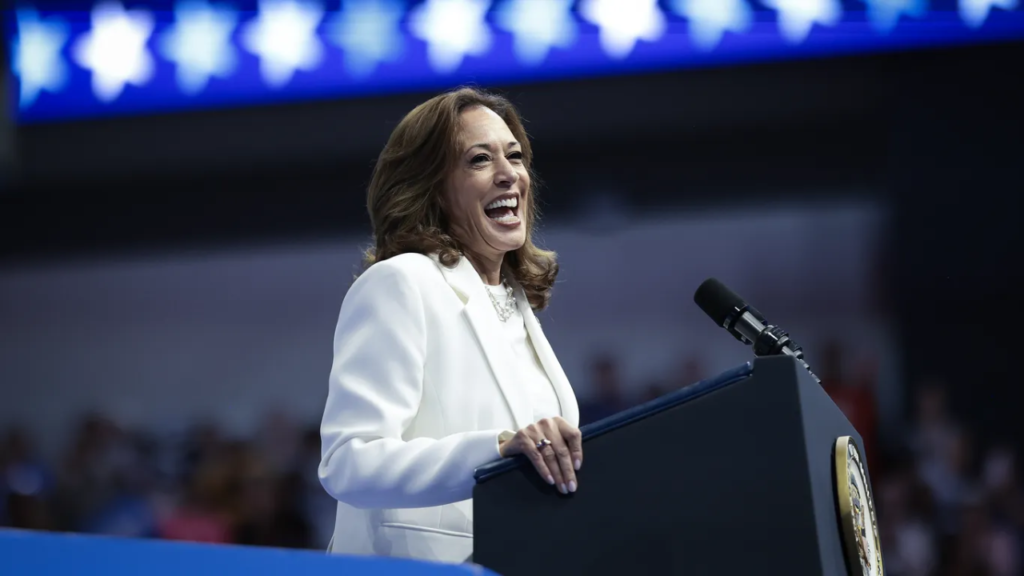
Former Speaker of the House Nancy Pelosi strongly criticized media outlets, particularly CNN, for airing former President Donald Trump’s remarks about Vice President Kamala Harris.
During a CNN appearance, Trump made comments suggesting that Harris has “bigger cognitive problems” than President Joe Biden.
Pelosi, visibly frustrated, questioned the necessity of covering such statements and labeled Trump as someone unworthy of the platform.
As the 2024 election campaign continues to heat up, both parties have ramped up their rhetoric, with Trump’s controversial comments once again placing him in the spotlight.
Pelosi’s reaction underscores the growing tensions between political figures as they defend their positions and allies.
Pelosi, a prominent Democratic figure, has never shied away from speaking her mind, especially when it comes to defending fellow Democrats.
Her remarks reflect the ongoing debate about how the media should handle inflammatory or misleading statements made by influential figures.
As the election cycle continues, the conversation about media responsibility and the impact of political discourse will remain central.
Is Capitalism More Popular Than Taylor Swift? The Answer Might Surprise You
Why Pelosi Wants CNN to Stop Airing Trump’s Remarks
Nancy Pelosi firmly believes that CNN should not give airtime to Donald Trump’s comments about Vice President Kamala Harris’s cognitive abilities.
In her view, these remarks are not only unfounded but also serve to perpetuate harmful narratives. Pelosi said, “Why would you even cover that? This is a person who’s not on the level.”
Her stance is clear—Trump’s comments are baseless and do not deserve the attention they’re receiving from major news networks.
Pelosi has consistently positioned herself as a defender of both the Democratic Party and the women within it.
By calling out Trump’s remarks, she aimed to protect Harris and shift the focus back to issues that matter. Pelosi believes that Trump’s remarks are not only politically motivated but also part of a broader pattern of undermining female leaders.
She labeled Trump’s words as an “assault on women,” emphasizing the need for media outlets to avoid amplifying such harmful narratives.
Trump’s Comments on Harris and Media Coverage
During a rally in Savannah, Georgia, Trump took direct aim at Vice President Kamala Harris, claiming that world leaders were laughing at her and expressing disbelief that she might become president.
These remarks came during a broader criticism of the Biden administration, where Trump repeatedly questioned both Biden’s and Harris’s mental fitness for office.

His comments sparked an immediate backlash from Democratic leaders, including Pelosi, who felt that the media, specifically CNN, was wrong to give these statements a platform.
Trump’s remarks are part of his ongoing effort to frame Harris as an unqualified leader, using cognitive ability as a weapon against her.
This tactic mirrors his previous attacks on President Biden, where he consistently questioned Biden’s mental sharpness.
However, Pelosi and many other Democratic leaders see this as a deliberate attempt to distract from policy discussions and to attack Harris on a personal level.
For them, Trump’s focus on cognitive issues is a political strategy meant to undermine the credibility of the Biden-Harris administration without engaging in substantive debate.
Pelosi’s Defense of Kamala Harris and Women Leaders
Pelosi’s response to Trump’s comments is not just about defending Kamala Harris—it’s about defending women in leadership positions as a whole.
By referring to Trump’s remarks as an “assault on women,” Pelosi tapped into a broader conversation about how female leaders are often subject to attacks that question their intelligence, competence, and abilities in ways that male leaders are not.
Pelosi has long been an advocate for women in politics, and her defense of Harris is a continuation of that advocacy.
Pelosi’s statement reflects the frustrations of many women who feel that gendered attacks, such as the one made by Trump, are a persistent barrier to achieving true equality in leadership roles.
She has called on the media to be more responsible in how they cover such statements, urging them to avoid giving a platform to comments that are not rooted in fact but are instead designed to demean and belittle female leaders.
For Pelosi, defending Harris is not just about politics; it’s about standing up for women’s rights and challenging the double standards that often exist in political discourse.
Trump’s Record and Pelosi’s Broader Critique
In addition to her criticism of Trump’s comments about Harris, Pelosi also took the opportunity to criticize Trump’s record as president.
She noted that during his time in office, Trump passed a tax cut that primarily benefited the wealthiest Americans, adding $2 trillion to the national debt.
Pelosi also highlighted Trump’s poor job creation record, stating that he had the “worst job creation record of any president since Herbert Hoover.”
This broader critique of Trump’s presidency serves to remind voters of the economic policies that Pelosi believes were harmful to the majority of Americans.
By linking Trump’s comments about Harris to his overall performance as president, Pelosi aimed to frame his attacks as part of a larger pattern of incompetence and failure.
For Pelosi, Trump’s remarks about Harris are just one example of his unsuitability for office, both in terms of his policies and his conduct.
TikToker Shares Heartbreaking Story of a Man Who Accidentally Stabbed Himself!
Conclusion
Nancy Pelosi’s call for CNN to stop airing Trump’s remarks about Kamala Harris underscores her belief in the importance of responsible media coverage.
She views Trump’s comments as not only inaccurate but also damaging to the political discourse, particularly when it comes to the treatment of women leaders.
As the 2024 election approaches, figures like Pelosi are making it clear that they will not tolerate baseless attacks on their colleagues, and they are calling on the media to do the same.
The broader conversation about media responsibility and the role of inflammatory statements in politics will likely continue to evolve as the campaign season heats up.
